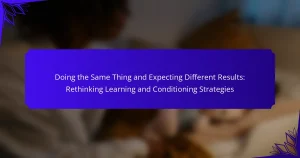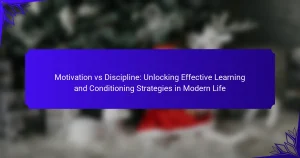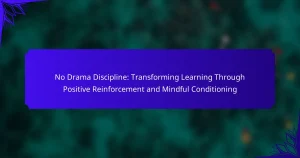Achieving emotional resilience and personal growth is essential for navigating life’s challenges. Life Balance Counseling enhances well-being through mindful learning, adaptive conditioning techniques, and personalized strategies. Clients learn to manage stress, improve focus, and develop healthier relationships. This structured support fosters greater self-awareness and life satisfaction, empowering individuals to take control of their circumstances.

What is Life Balance Counseling?
Life Balance Counseling helps individuals enhance emotional resilience, engage in mindful learning, and apply adaptive conditioning techniques. This approach promotes well-being by addressing life challenges through structured support. Clients learn to navigate stress, improve focus, and foster personal growth. Techniques may include mindfulness practices, cognitive-behavioral strategies, and goal-setting frameworks. As a result, participants often report increased life satisfaction and a greater sense of control over their circumstances.
How does it integrate emotional resilience?
Life Balance Counseling integrates emotional resilience by teaching individuals effective coping strategies and adaptive techniques. It emphasizes mindful learning, enabling clients to process emotions constructively. This approach fosters self-awareness, which is a unique attribute of emotional resilience. Clients learn to recognize triggers and respond positively, enhancing their overall mental well-being. As a result, they develop a robust framework to navigate life’s challenges.
What role does mindful learning play in counseling?
Mindful learning enhances counseling by fostering emotional resilience and self-awareness. This approach encourages clients to engage fully in the therapeutic process, promoting deeper insights and personal growth. By practicing mindfulness, individuals develop adaptive coping strategies, improving their overall mental health. Research indicates that integrating mindful learning techniques in counseling can lead to significant reductions in anxiety and depression symptoms. This unique attribute of mindful learning empowers clients to navigate challenges with greater ease and confidence.
What are adaptive conditioning techniques?
Adaptive conditioning techniques enhance emotional resilience through structured practices. These methods focus on modifying responses to stressors, promoting mindfulness and self-awareness. Techniques include cognitive restructuring, exposure therapy, and mindfulness exercises. Each approach fosters adaptability, enabling individuals to manage challenges effectively. Mastering these techniques can lead to improved mental well-being and life balance.

What are the universal benefits of Life Balance Counseling?
Life Balance Counseling offers numerous universal benefits that enhance emotional resilience, promote mindful learning, and refine adaptive conditioning techniques. These benefits include improved stress management, increased self-awareness, enhanced coping strategies, and greater life satisfaction. Participants often experience a deeper understanding of their emotions and develop healthier relationships, fostering a supportive environment for personal growth. As a result, individuals can navigate life’s challenges more effectively, leading to a balanced and fulfilling life.
How does it enhance emotional intelligence?
Life Balance Counseling enhances emotional intelligence by fostering self-awareness, empathy, and effective communication skills. Through mindful learning techniques, individuals develop a deeper understanding of their emotions, leading to improved interpersonal relationships. Adaptive conditioning techniques further support emotional resilience, enabling individuals to navigate challenges with greater ease. As a result, participants experience a significant increase in their ability to manage stress and respond to others’ emotional needs.
What impact does it have on stress management?
Life Balance Counseling significantly enhances stress management by fostering emotional resilience and adaptive techniques. It equips individuals with mindful learning strategies that help them recognize stress triggers. As a result, clients develop healthier coping mechanisms, reducing anxiety and promoting overall well-being. Research indicates that these counseling methods can lead to a 30% decrease in stress levels over time. By mastering emotional resilience, individuals can navigate life’s challenges more effectively, improving their mental health and quality of life.
What improvements can be seen in interpersonal relationships?
Life Balance Counseling enhances interpersonal relationships by fostering emotional resilience, promoting mindful learning, and introducing adaptive conditioning techniques. Improved communication skills emerge as individuals learn to express emotions effectively. Trust builds through consistent support and understanding, leading to deeper connections. Conflict resolution becomes more manageable, as individuals apply adaptive techniques to navigate disagreements. Overall, these improvements contribute to healthier, more fulfilling relationships.

What are the unique attributes of Life Balance Counseling?
Life Balance Counseling uniquely emphasizes emotional resilience, mindful learning, and adaptive conditioning techniques. Its core attributes include personalized strategies, holistic approaches, and evidence-based practices. A unique attribute is its focus on integrating mindfulness into everyday life, enhancing self-awareness and emotional regulation. This method supports individuals in developing sustainable coping mechanisms, fostering long-term mental well-being.
How does it differ from traditional counseling methods?
Life Balance Counseling differs from traditional counseling methods by focusing on emotional resilience and adaptive techniques. Traditional methods often emphasize problem-solving, while Life Balance Counseling promotes proactive skill development. This approach encourages mindful learning, enabling individuals to navigate challenges more effectively. Additionally, it integrates techniques that foster long-term emotional well-being rather than solely addressing immediate issues.
What specific techniques are used for emotional resilience?
Life Balance Counseling employs various techniques for emotional resilience, including cognitive restructuring, mindfulness practices, and adaptive conditioning. Cognitive restructuring helps individuals challenge negative thought patterns, promoting a more balanced perspective. Mindfulness practices enhance self-awareness and emotional regulation, allowing for better responses to stress. Adaptive conditioning techniques focus on developing positive habits and coping strategies, reinforcing resilience over time.
In what ways does it incorporate technology for learning?
Life Balance Counseling incorporates technology for learning through interactive platforms, mobile applications, and virtual workshops. These tools facilitate personalized learning experiences, enhance engagement, and provide access to a wealth of resources. For instance, mobile apps offer guided mindfulness exercises, while virtual workshops enable real-time interaction with experts. Additionally, data analytics can track progress, making adaptive conditioning techniques more effective. Overall, technology enhances emotional resilience by providing flexible and accessible learning opportunities.

What rare attributes make Life Balance Counseling stand out?
Life Balance Counseling stands out due to its unique approach that integrates emotional resilience, mindful learning, and adaptive conditioning techniques. One rare attribute is its focus on personalized resilience strategies tailored to individual experiences. This method enhances emotional intelligence, enabling clients to navigate life’s challenges more effectively. Additionally, the incorporation of mindfulness practices fosters a deeper self-awareness, which is uncommon in traditional counseling. The program also emphasizes adaptive conditioning, helping clients develop flexible coping mechanisms that are not widely practiced in standard therapeutic settings.
How does it address cultural sensitivities?
Life Balance Counseling addresses cultural sensitivities by promoting inclusivity and respect for diverse backgrounds. It incorporates culturally relevant practices that resonate with individual values and beliefs. Counselors undergo training to understand various cultural contexts, ensuring that interventions are appropriate and effective. This approach fosters trust and openness, allowing clients to engage more fully in their emotional resilience journey. Additionally, adaptive conditioning techniques are tailored to align with cultural norms, enhancing the overall effectiveness of the counseling process.
What innovative approaches are employed in adaptive conditioning?
Innovative approaches in adaptive conditioning focus on personalized strategies that enhance emotional resilience. Techniques include mindfulness practices, cognitive restructuring, and biofeedback. These methods promote self-awareness and adaptability, enabling individuals to navigate challenges effectively. Integration of technology, such as mobile apps for tracking progress, further supports these approaches by providing real-time feedback and tailored exercises.
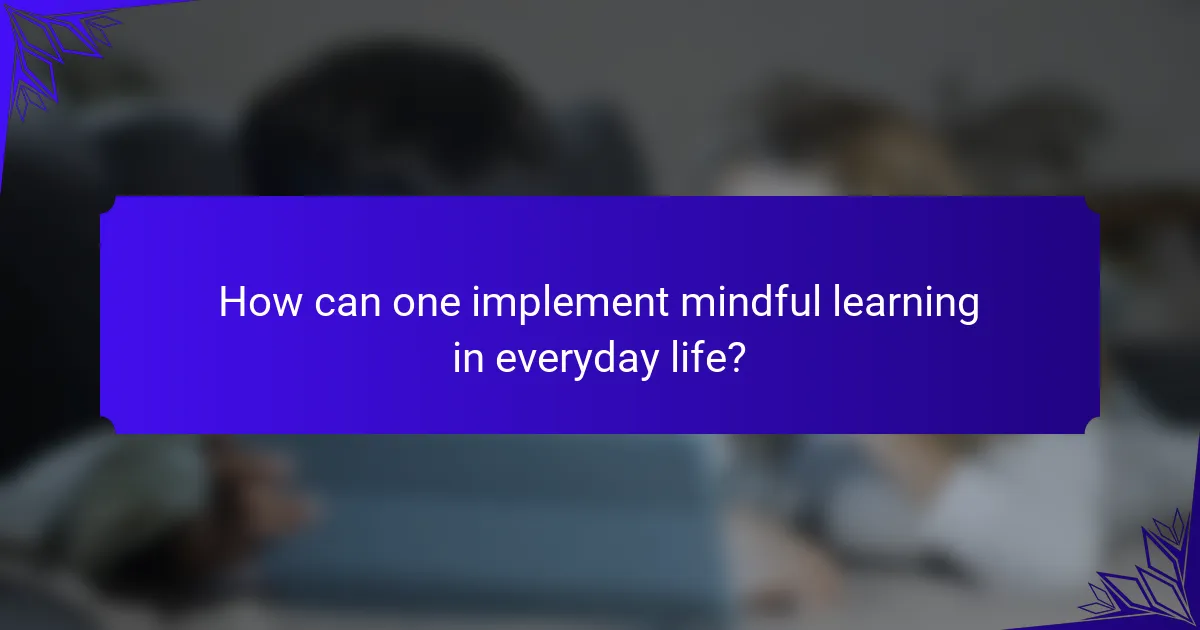
How can one implement mindful learning in everyday life?
Implementing mindful learning in everyday life involves integrating awareness and reflection into daily activities. Start by setting aside time for self-reflection to understand your thoughts and feelings. Incorporate mindfulness practices, such as meditation or breathing exercises, to enhance focus. Create a learning environment free from distractions, allowing deeper engagement with material. Utilize adaptive conditioning techniques, like positive reinforcement, to promote continuous learning. Lastly, embrace emotional resilience by viewing challenges as opportunities for growth.
What are practical strategies for mindful learning?
Practical strategies for mindful learning include setting clear intentions, practicing self-reflection, and utilizing adaptive techniques. These methods enhance emotional resilience and promote deeper engagement with learning materials.
1. Set clear intentions: Define specific learning goals to maintain focus.
2. Practice self-reflection: Regularly assess your understanding and progress.
3. Utilize adaptive techniques: Incorporate various learning styles to enhance retention.
4. Create a conducive environment: Minimize distractions to foster concentration.
5. Manage time effectively: Allocate specific periods for focused learning sessions.
6. Engage in mindfulness practices: Use meditation or breathing exercises to enhance awareness and reduce stress.
How can journaling enhance the learning process?
Journaling enhances the learning process by promoting self-reflection, improving memory retention, and fostering emotional resilience. It allows individuals to articulate thoughts, clarify understanding, and track progress. As a result, learners develop adaptive conditioning techniques that reinforce mindful learning. Regular journaling cultivates a deeper connection to the material, making it easier to integrate new knowledge.
What role does meditation play in mindfulness?
Meditation enhances mindfulness by cultivating awareness and emotional regulation. It fosters emotional resilience through focused attention and self-reflection. Regular practice improves stress management, promoting a balanced life. Research shows that meditation can decrease anxiety by 60%, highlighting its role in emotional stability.

What common mistakes should be avoided in Life Balance Counseling?
Avoiding common mistakes in Life Balance Counseling is crucial for effective emotional resilience and mindful learning. Key mistakes include neglecting personalized approaches, overlooking the importance of active listening, failing to set clear goals, and not integrating adaptive conditioning techniques. These errors can hinder progress and diminish the overall effectiveness of counseling sessions. Prioritizing tailored strategies and fostering open communication can enhance the counseling experience significantly.
How can miscommunication affect counseling outcomes?
Miscommunication can significantly hinder counseling outcomes by creating misunderstandings and mistrust between the counselor and client. Effective communication is essential for establishing a strong therapeutic alliance, which is crucial for emotional resilience and mindful learning. When clients feel misunderstood, their willingness to engage in adaptive conditioning techniques may decrease, leading to less effective counseling sessions. Additionally, unclear communication can result in unmet expectations, further complicating the counseling process. Addressing miscommunication promptly improves rapport and enhances overall counseling effectiveness.
What are the pitfalls of neglecting emotional self-care?
Neglecting emotional self-care can lead to significant pitfalls, including increased stress, anxiety, and emotional burnout. These consequences hinder emotional resilience and adaptive conditioning, essential for maintaining life balance. Without regular emotional care, individuals may struggle with mindfulness, making it difficult to engage in effective learning and personal growth. As a result, neglect can create a cycle of emotional instability, impacting overall well-being and relationships.
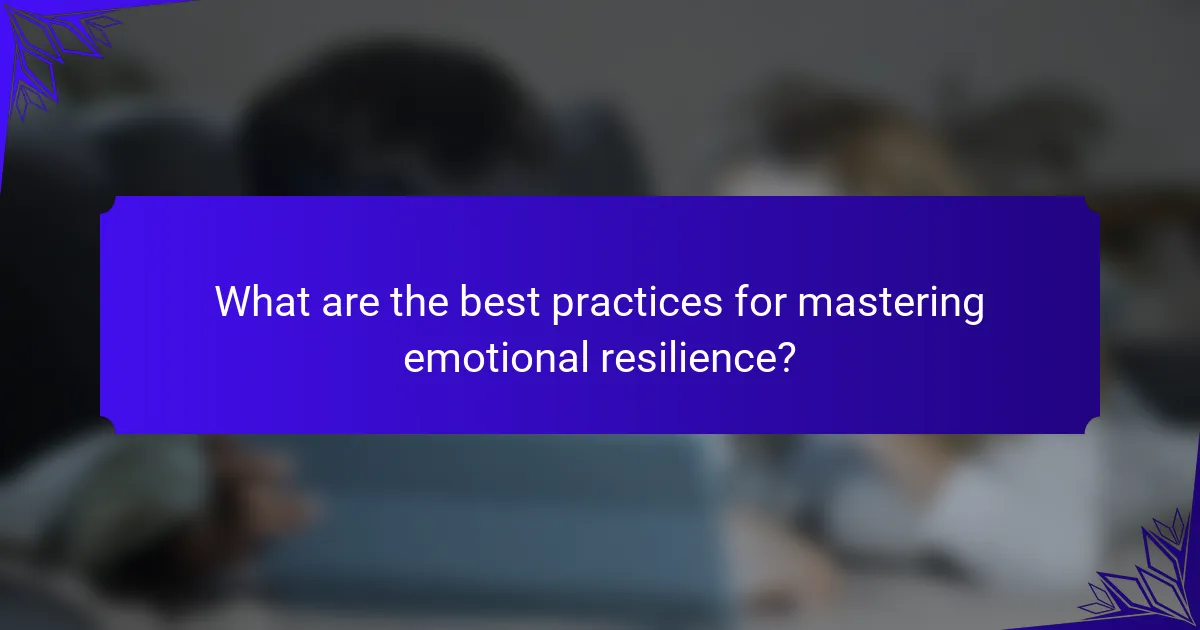
What are the best practices for mastering emotional resilience?
To master emotional resilience, practice self-awareness, develop coping strategies, and maintain a supportive network. Engage in mindfulness techniques to enhance emotional regulation. Regularly reflect on experiences to foster growth and adaptability. Consistent application of these practices strengthens resilience over time.
How can setting boundaries improve emotional health?
Setting boundaries significantly enhances emotional health by fostering self-respect and reducing stress. Establishing clear limits helps individuals prioritize their needs, leading to improved relationships and personal well-being. Research indicates that people who set healthy boundaries experience lower anxiety levels and increased overall life satisfaction. Moreover, mastering adaptive conditioning techniques in life balance counseling can empower individuals to maintain these boundaries effectively, promoting emotional resilience.
What daily habits support emotional resilience?
Daily habits that support emotional resilience include practicing mindfulness, maintaining a balanced routine, and engaging in physical activity. Mindfulness enhances self-awareness and stress management. A balanced routine fosters stability and predictability in daily life. Regular physical activity releases endorphins, improving mood and reducing anxiety. Additionally, cultivating social connections provides emotional support and strengthens coping mechanisms. These habits collectively contribute to mastering emotional resilience.
How can one measure progress in emotional resilience?
Measuring progress in emotional resilience involves tracking specific behaviors and emotional responses over time. Key indicators include the ability to cope with stress, adaptability to change, and the maintenance of positive relationships.
Utilizing tools like self-assessment surveys can provide insights into emotional responses. Regular reflection on challenges faced and strategies employed helps identify growth areas. Additionally, feedback from counseling sessions can highlight improvements in emotional regulation and resilience.
Engaging in mindful learning techniques enhances self-awareness, allowing individuals to recognize their emotional patterns. Adaptive conditioning techniques support the development of healthier coping mechanisms, further contributing to emotional resilience.
Ultimately, progress is reflected in increased emotional stability, improved coping strategies, and a greater sense of life balance.
